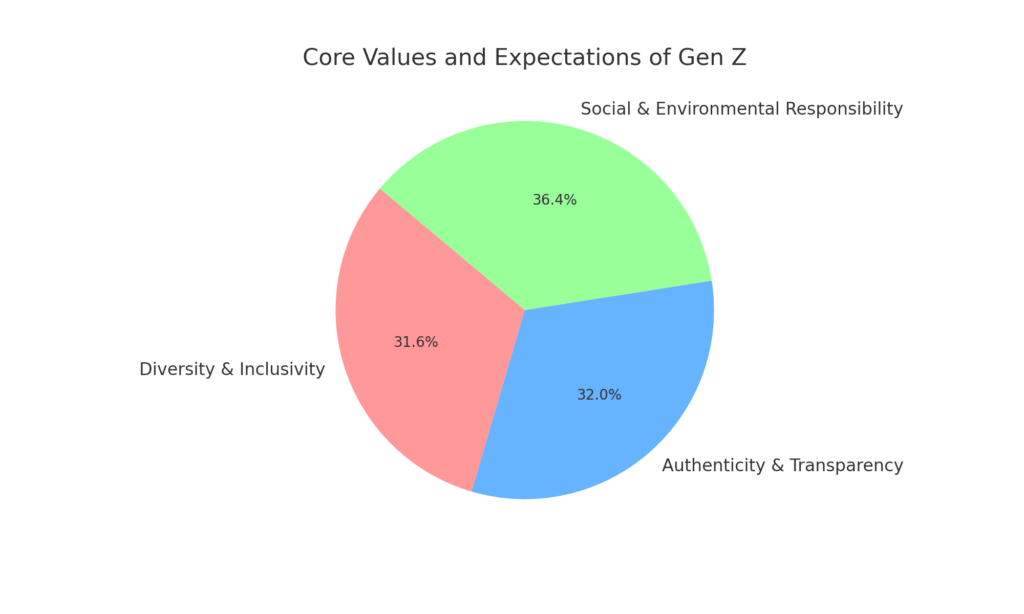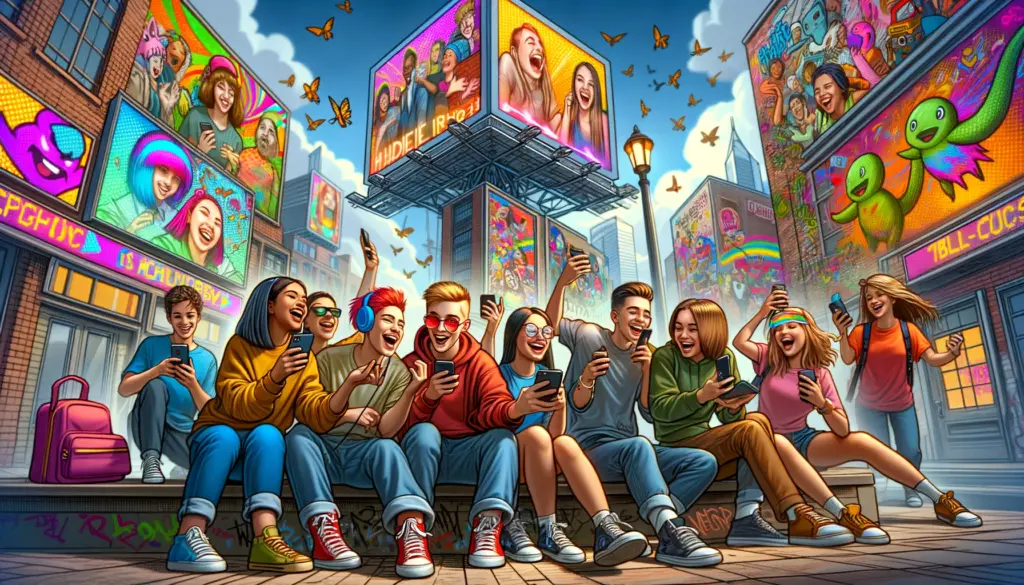Generation Z, born between 1997 and 2012, are digital natives who have grown up in an interconnected world. As the first true smartphone generation coming of age, Gen Z consumers have distinctive expectations and values that set them apart from previous demographics.
To effectively engage and convert Gen Z audiences in 2024, brands must tailor their marketing strategies to align with this generation’s preferences. Those who successfully adapt their approach stand to benefit from the $143 billion spending power of Gen Z consumers.
This blog post explores the core values and attitudes that shape Gen Z’s purchasing behavior. It provides actionable techniques to optimize content, personalization, community building, and digital innovation when targeting this demographic. By implementing the Gen Z marketing strategies outlined, brands can future-proof their marketing to thrive in the era of Gen Z dominance.
- Understanding Gen Z's Core Values and Expectations
- Optimizing Content for Gen Z Engagement
- Personalization and Community Building
- Embracing Digital Innovations and Trends
- Top 10 Strategies for Effective Gen Z Marketing
- 1. Incorporate Diverse and Inclusive Messaging
- 2. Champion Social Causes and Environmental Sustainability
- 3. Foster Transparent Communications
- 4. Produce Short-Form Video Content
- 5. Infuse Relatable Cultural Humor
- 6. Curate User-Generated Content
- 7. Offer Personalized Experiences
- 8. Cultivate Online Brand Communities
- 9. Experiment with Immersive Technology
- 10. React to Viral Trends
- Conclusion
- Gen Z Marketing Strategies Related FAQs
- What platforms should you use to reach Gen Z?
- How can brands earn Gen Z's trust and loyalty?
- What tone and messaging resonates with Gen Z?
- How can you create viral content for Gen Z audiences?
- Why is video content key for Gen Z marketing?
- What innovations can enhance Gen Z experiences?
- How do you optimize ecommerce for Gen Z shoppers?
- Why should brands take social stances?
- How can marketing stay relevant to fast-changing Gen Z tastes?
- Why is personalization key for Gen Z marketing?
Understanding Gen Z’s Core Values and Expectations
Several key factors influence Gen Z’s relationship with brands, informing the way companies should approach this audience.
Diversity and Inclusivity
Growing up in an increasingly diverse world, Gen Z expects authentic representation across race, gender, sexuality, and ability in branding and advertising. 72% believe the brands they support should reflect diversity in their workforce and content.
Companies hoping to connect with Gen Z must incorporate inclusive stories and perspectives across their platforms. Strategic partnerships and collaborations with diverse creators also help build trust and loyalty among socially-conscious Gen Z audiences.

Authenticity and Transparency
In a digitally integrated world, Gen Z has highly attuned radars for disingenuous branding and hollow corporate rhetoric. 73% say authenticity is very important when deciding which companies they like and support.
Brands must back up social and environmental commitments with measurable impact actions. Transparent communication addressing issues like sustainability, ethical labor, and fair trade can nurture trust among skeptical Gen Z consumers.
Social and Environmental Responsibility
Gen Z cares deeply about seeing real change within society and protecting the planet for future generations. 83% believe companies have an obligation to address social, environmental and sustainability issues.
Leading brands are interweaving their core business missions with socially conscious and eco-friendly practices. Patagonia and Ben & Jerry’s stand out for prioritizing environmental activism over profits. Other companies are wise to follow suit if they want to earn Gen Z’s brand loyalty.

Optimizing Content for Gen Z Engagement
While Gen Z’s values inform why they buy, brands must also optimize content and storytelling formats to capture this generation’s finite attention spans.
Leverage Short-Form Video
As pioneers of the TikTok age, 60% of Gen Z rely on platforms like Snapchat, Instagram and YouTube for discovering and researching new products.
Short-form video ads and influencer collaborations allow brands to condense messaging into digestible content. Tapping into viral trends and hook-driven storytelling techniques used on TikTok can help companies creatively engage Gen Z audiences where they already spend time.
Humor and Relatability
Gen Z appreciates brands that tap into shared cultural references and don’t take themselves too seriously. 72% say they would try a brand again if their marketing made them laugh.
Infusing video content and ad campaigns with ironic humor and meme-culture nostalgia strengthens Gen Z’s perceived common ground with brands. Relatable teen and college-aged influencers also lend an authentic voice to connect with young consumers on an emotional level.
User-Generated Content and Influencer Collaborations
As digital natives, Gen Z is highly responsive to UGC and peer endorsements across social media. 74% say content created by someone like them e.g. a friend is more likely to influence their purchasing decisions.
Strategic collaborations with nano and micro-influencers in Gen Z’s networks provide authentic social proof. UGC campaigns inspiring audiences to create and share their own stories also foster a creative brand community.

Personalization and Community Building
While digital content drives discovery, Gen Z still expects tailored real-world experiences and human connection from the brands they support over the long-term.
Personalized Experiences
After growing up in a world of instant gratification and customized content, Gen Z has little patience for impersonal shopping experiences. 82% say they would pay more for a brand that provides a personalized service.
Retailers should make use of data insights and digital integration to provide customized product recommendations and tailored customer service interactions. Augmented reality also creates opportunities for virtually trying products to align with personal tastes.
Building Online Communities
Digital community-building gives brands access to their most passionate Gen Z fans. 71% participate in brand communities to connect with like-minded individuals.
Niche community platforms like Discord and Reddit enable organic peer sharing around interests and hobbies. Brands who cultivate spaces for user-led growth and engagement can benefit from ambassadors authentically advocating their products through content and conversations.

Embracing Digital Innovations and Trends
While strong values and personalized connections inform Gen Z loyalty, brands must also demonstrate digital savviness to continually grab this generation’s attention in the social media age.
Innovative Technology Use
As pioneers of the digital landscape, Gen Z has an insatiable appetite for companies incorporating cutting-edge technology into their experiences. From AR shopping to connected devices, advanced integrations make brands seem progressive rather than dated.
Immersive technologies like virtual concerts and hybrid physical/digital concept stores also allow brands to drive culture while positioning themselves at the intersection of online and offline worlds Gen Z inhabits.
Staying Trend-Savvy
From meme humor to platform-specific slang, Gen Z’s tastes evolve rapidly according to shifting cultural currents. Brands must have their fingers on the pulse of youth trends to tap into viral moments and conversations that captivate Gen Z’s consciousness.
Ongoing social listening, influencer partnerships and owned community engagement provides valuable proximity to the nuances of Gen Z’s ever-changing digital tastes. Brands maintaining steady cultural awareness can activate trends through reactive content that feels exciting and of-the-moment to Gen Z audiences.

Top 10 Strategies for Effective Gen Z Marketing
While the previous sections outline macro trends to inform messaging and experiences, Gen Z-tailored marketing requires tailored strategies across the purchase funnel.
1. Incorporate Diverse and Inclusive Messaging
Diversity and inclusion form the bedrock of Gen Z’s worldview. Having grown up exposed to more varied perspectives than any previous generation, 82% expect the brands they support to authentically reflect diversity in their workforce and content.
Strategic brand partnerships with creators of diverse backgrounds help nurture organic connections with different communities. Inclusive representation should also be incorporated across channels, from social media visuals to website imagery and ad casting.
Content anchored in themes of empowerment around race, gender, sexuality and ability builds trust with socially conscious Gen Z audiences. Brand campaigns highlighting diversity through employee spotlights, UGC and influencer collaborations signal a tangible commitment to Gen Z’s values around equitable representation.
2. Champion Social Causes and Environmental Sustainability
Beyond prioritizing inclusive content, Gen Z consumers favor companies actively using business as a force for good. 83% believe brands have an obligation to get involved in social and environmental issues.
Patagonia and Ben & Jerry’s exemplify brand activism in action, building loyal Gen Z followings through high-profile initiatives like environmental conservation efforts and grassroots activism campaigns.
While not every brand can make societal impact their defining mission, partnering with aligned nonprofits and communicating CSR efforts shows Gen Z that companies share their commitment to catalyzing change. Brands can tap into cultural moments ripe for conscious participation, like Pride Month and Black History Month, to creatively demonstrate shared values with Gen Z audiences.
3. Foster Transparent Communications
In today’s hyper-informed and interconnected landscape, Gen Z holds high expectations for ethical business practices and visible integrity across the brands they support. 73% cite brand authenticity as very important in driving their purchasing decisions.
Transparent communication addressing issues like sustainability, ethical labor and fair trade nurtures trust among skeptical Gen Z audiences. Sharing actionable commitments, measurable goals and regular progress reports demonstrates accountability brands must embrace to earn Gen Z’s loyalty.
Brand content highlighting behind-the-scenes insights into sourcing partnerships, supply chains and sustainability initiatives also conveys authentic transparency. Democratizing access to business operations in this way bolsters Gen Z’s perceived relationship with companies as they make informed choices.
4. Produce Short-Form Video Content
As pioneers of the TikTok era, 60% of Gen Z turn to platforms like Snapchat, Instagram and YouTube to discover and evaluate brands. Short-form video represents the optimal format for communicating concise and compelling narratives to Gen Z’s digitally-trained attention spans.
Brands have tremendous opportunities through instructional how-to’s, relatable vlogs, humorous sketches and other creative videos delivered through in-feed social advertising. Partnering with Gen Z micro-influencers grants access to authentic storytelling that feels native to these platforms’ participatory cultures.
Experimenting with viral trends and audio-on formats popularized on TikTok can translate into expanded organic reach and engagement. Consistently producing snackable video content also provides more touchpoints to grab Gen Z’s interest across their daily social media journeys.
5. Infuse Relatable Cultural Humor
Gen Z’s internet upbringing nurtured an appreciation for memes, irony and absurdist humor. 72% say they would try a brand again if their marketing made them laugh.
Brands can establish common ground with Gen Z by incorporating cultural entertainment references and not taking themselves too seriously. Meme templates and reactive humor that taps into trending conversations signals awareness of youth digital spaces beyond surface-level demographic targeting.
Younger influencer collaborators lend brands access to comedic sensibilities authentic to teen and college-aged peers. Comedic video campaigns and entertaining social posts, while aligned to brand voice, should embrace the weirdness and irreverence Gen Z responds to.
6. Curate User-Generated Content
As digital natives since birth, Gen Z expertsly navigates social platforms and networked information flows. 71% say UGC created by someone like them, such as a friend or peer, holds greater influence than brand-created content in driving their purchase decisions.
Strategic collaborations with nano and micro-influencers provide brands access to authentic peer-to-peer recommendations. UGC campaigns rallying Gen Z audiences to create and share their own stories, reviews or creative interpretations of branded products fosters an organic brand community with strong ties to youth culture.
Website integrations displaying user reviews, showcasing user-submitted art and photography, and embedding crowd-sourced social content grounds brands within the cultural conversations and creative expressions Gen Z values most.
7. Offer Personalized Experiences
Despite their digital dominance, Gen Z still expects tailored real-world experiences from the brands they engage with over the long term. 72% say they are willing to pay more for brands that provide personalized recommendations, services and communications that understand their individual needs and preferences.
Retailers can incorporate data insights with digital integrations to provide customized product suggestions and tailored customer service interactions. Social listening also reveals opportunities for niche audience segmentation to inform content personalization strategies with relevant messaging per interest group.
Brand experiences like hybrid online/offline concept stores, virtually-enhanced fitting rooms and AR product previews enable more personalized shopping aligned with Gen Z’s affinity for digital connection.
8. Cultivate Online Brand Communities
Digital community-building enables brands to foster closer ties with their most passionate Gen Z fans. 71% participate in brand communities to connect with like-minded individuals around shared interests and values.
Emerging platforms like Discord and Reddit move beyond one-to-many broadcasting to facilitate intimate conversations and grassroots community growth. Brands who dedicate resources to nurturing niche channels, micro-communities and their self-elected leaders can benefit from spaces where influencers and advocates organically emerge.
Facilitating collaborative connections around creativity, problem-solving and Gen Z culture spotlights brands’ understanding of community codes built on participation rather than promotion. Brand super fans will spread authentic word-of-mouth influence as communities become vibrant hubs for engagement in their own right.
9. Experiment with Immersive Technology
For digital pioneers, Gen Z’s appetite for cutting-edge technology integration seems insatiable. Brand experiences enhanced through innovations like augmented reality, 3D product visualizations, connected devices and virtual spaces signal to Gen Z audiences that companies share their future-focused mindsets.
Younger audiences are highly responsive to digitally interactive concepts that add value, convenience or entertainment to their journeys. AR try-on capabilities, shoppable livestreams, and virtual product demos showcase technological savviness aligned with Gen Z preferences.
Accessible experiments will help brands identify which emerging technologies hold relevance for their audience interests to inform scalable activations as platforms and devices advance.
10. React to Viral Trends
Gen Z’s tastes evolve rapidly according to digitally accelerated news and culture cycles. Brands hoping to drive relevance with Gen Z over the long term must commit resources towards tracking youth trends and the nuances of niche community conversations.
Ongoing social listening provides valuable proximity to Gen Z spaces for detecting viral platform behaviors and meme references before they permeate mass culture. Brands can activate trending cultural moments through reactive campaigns if responses feel authentic rather than opportunistic.
Influencer partners tapped into pulse shifts as they emerge lend brands trusted voices to translate trends to campaigns with credibility. Consistent proximity to Gen Z’s ever-changing digital ecosystem minimizes reaction times for brands to craft creative activations that captivate audiences by feeling exciting and of-the-moment.
Conclusion
As Gen Z enters their prime spending years while wielding significant economic and cultural influence, they stand to reshape brand strategies across industries. Companies who align their messaging, experiences and practices with Gen Z’s defining values will secure relevance and loyalty from this generation of digital change-makers.
While their high expectations around diversity, social responsibility and integrity present challenges for brands accustomed to marketing through aspirational lifestyles alone, those who embrace Gen Z’s worldview have much to gain. Immersive digital content, personalized services, niche community building and innovative technology usage must become standard components of any future-proofed Gen Z strategy.
As this generation develops more refined tastes and nuanced preferences over time, brands must also commit to continually tracking youth culture and evolving their strategies accordingly. Maintaining proximity to Gen Z’s digital spaces and pulse will provide the agility needed to activate trends, optimize engagement and drive enduring advocacy as new platforms and paradigms inevitably emerge.
Brands who invest now in understanding the factors driving Gen Z’s attitudes and behaviors will build solid foundations for long-term resonance across this valuable demographic’s evolving purchase journey.
What resonated with you in this exploration of Gen Z marketing techniques? Which strategies are you currently implementing or planning to activate in 2024 campaigns? What other suggestions do you have for effectively targeting these young consumers?
Share your perspectives in the comments below or reach out for one-on-one consulting on building customized Gen Z strategies fit for the digital-first era ahead.
Gen Z Marketing Strategies Related FAQs
What platforms should you use to reach Gen Z?
Focus on visually-driven platforms popular with Gen Z like TikTok, Instagram, Snapchat, and YouTube. Tailor content formats and messaging to leverage the unique users and use cases of each platform.
How can brands earn Gen Z’s trust and loyalty?
Convey authenticity through transparent communication and standing up for social causes. Facilitate intimate brand communities to foster a sense of belonging.
What tone and messaging resonates with Gen Z?
Gen Z favors relatable, humorous, and entertaining content. Leverage cultural references and influencer collaborations for authentic and engaging storytelling.
How can you create viral content for Gen Z audiences?
Experiment with popular TikTok trends, audio formats, memes, and reactive humor. Collaborate with nano-influencers tapped into the pulse of youth culture.
Why is video content key for Gen Z marketing?
60% of Gen Z relies on video platforms for discovering products. Short-form video ads and collabs optimized for mobile viewing align to Gen Z’s digitally-trained attention spans.
What innovations can enhance Gen Z experiences?
Incorporate technologies like augmented reality, virtual spaces, and interactive features to showcase technological fluency and future-focused mindsets.
How do you optimize ecommerce for Gen Z shoppers?
Offer expedited fulfillment, frictionless returns, and flexible payment plans catering to Gen Z preferences for instant gratification and personalized experiences.
Why should brands take social stances?
77% of Gen Z has advocated for causes they support. Brand activism around diversity, sustainability and social justice fosters deeper connections with socially-conscious Gen Z.
How can marketing stay relevant to fast-changing Gen Z tastes?
Continual proximity to youth culture via social listening and nano-influencer partnerships provides agility to react to viral platform behaviors and meme references.
Why is personalization key for Gen Z marketing?
81% of Gen Z prefers personalized ads over generic content. Precision ad targeting and community engagement enables relevant, individualized messaging that drives conversions.
